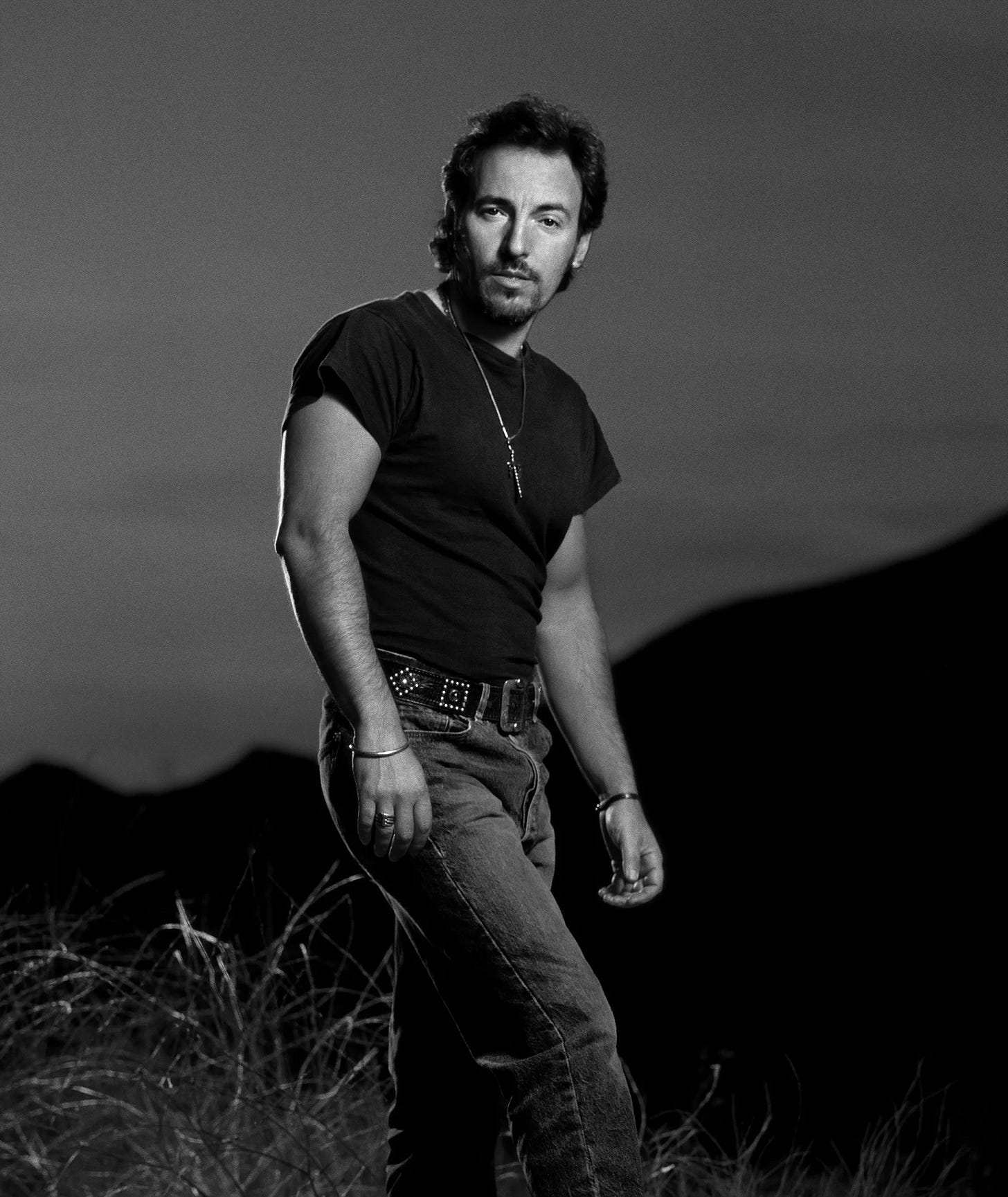Q: What’s in a Bruce? Would another Springsteen smell as sweet?
A: Kind of a weird question. I imagine he smells like the Jersey shoreline and steel mills.
A Book I Will Never Write, But Should
In another life, I would have written a collection of theological essays on the work of Bruce Springsteen. I had, until earlier this year, contracted to write such a work, but out of a need to simplify my life, cancelled it, and left it like a forgotten shirt at the river bank, for someone else to find and make good with. It was a hard decision to make, but fitting for a topic such as Bruce, whose music over the course of fifty years has been filled with nothing if not broken dreams.
The book would have looked something like this:
In the early days of Bruce’s work, there is something of a lonely streak that tails him. He is trying to figure out what it looks like to inherit the ghost of Elvis and put that ghost to work in the 1970s, and that isn’t easy work. He writes about growing up, and about racing gangs, but mostly, it’s a work of pining. It’s a work which has some of his earliest hits, and some of his absolute worst songs. But it’s lonely music: his next two albums, which feature his legendary E-Street Band—though they’re like family to him—are filled with catcalls and laments. Parties are catalogued and observed, but Bruce is never in the parties.
He’s just telling us about them.
His next six albums in a row are each masterpieces in their own right: I won’t argue about this—submit to the truth or go blind. But in addition to an expansive musical style, varying from solo guitar to synthesizer, he builds a set of companions on the road. Different musicians will rotate in and out of E-Street over the years, but the band is the common denominator. Even on his ostensibly solo albums, Max Weinberg is listed on drums at times1, and the material comes alive only in concert when the full band is in effect.
Along the way in these albums, as the E-Street becomes more of a common thread, another thing changes: Bruce adopts more and more a first-person persona in the songs. He becomes less an observer and chronicler, and takes on the mantle of the protagonist.
This is, I think, what friendship does: it pulls us in to life, because only in life can we truly be changed. If you’re going to seek after something good, you have to be in the position to grab hold of it, and that—whether you’re reading Aristole, Aelred, or Aquinas—is what true friendship does. Springsteen moves from being an observer of Jersey life to inhabiting it in his songs; he moves from an onlooker to taking on the voice of the working class.2 It’s not accident, I think, that after his breaks up the E-Street Band in 1989, he produces two of his absolutely worst albums, releasing them on the same day: he’s too inside his own head, too absorbed with his own stardom, and forgot the point of music isn’t to sing, but to be sung by your friends.3
The Unsung Goods of Friendship
When I think about not writing the Springsteen book, it becomes clear to me that what sets his music apart is the friendship4. The running joke that Jesus’ greatest miracle was having 12 friends as a 30-year old man isn’t far from the truth, and Springsteen’s perpetual praise of his own people, mourning their deaths and welcoming new friends into the band, bears testimony to this miracle. It’s what, to my mind, helps bands age gracefully: their music no longer has the teeth that it did, but you know that at least they’re having a good time together.5
But friendship isn’t togetherness, as if “being together” was the most important thing, or an end unto itself. Nazis can be together, and we wouldn’t call it good: we’d probably call the police.6 This is, to my mind what makes Toy Story 3 one of the most nihilist movies ever made—at the end of the film, you think they’re going to be engulfed by the incinerator, and they have the nerve to sit there holding hands. It’s the epitome of the ethos that “it doesn’t matter where we are, as long as we’re together”: I WOULD SUGGEST THAT IT MATTERS A GREAT DEAL WHERE THEY ARE.
Friendship is, by many lights, not only seeing the good together and staying together, but propelling each other toward that which is good. It’s the hard conversations that, in their friction, promise to make us whole if they don’t undo us, the submission of our egos to another in the hopes that we will be more of what we should be if we let go of the desire to be alone. It is no longer being called disciples but friends of God that, in this way, should both enliven us and terrify us, for friendship is more than presence but the possibility of holiness.
And so, friendship lies fallow in our age, not because it is undesired, but because we have structured our lives such to make friendship really hard to maintain. I think living on the road would be the worst possible kind of life, but at the same time, you’ve got ample time with your friends, doing the thing that is lovely and true and hopefully good.7
Yes, the same Max Weinberg who was in Letterman’s studio band was a staple of E-Street for decades.
Bruce has never been working class, by his own admission. It’s part of the complex part of being a Springsteen fan, having to acknowledge the fakery that goes into really great songs.
Part of why the book won’t be written is because Springsteen changes, as any successful artist does. You might have seen the commercial during the Super Bowl, or his podcast with President Obama: Bruce is comfortable being among the stars, though he’s still on the road touring. I find myself coming to terms with the possibility that this has always been the story, and that myth was always myth.
Though, I go back and forth on this. He’s very clear—and other bandmates are as well—that it’s Bruce’s band and Bruce’s music. It’s not a collaborative venture: the songwriting credits are Bruce’s credits.
I have a text thread with two friends about a very specific theme: The National, the kings of sad dad rock, another band that has always struck me as not only embracing the ravages of time well, but embracing it together.
Maybe? I’m not sure what Nazis standing around together have necessarily done wrong, although I’m sure there’s wrongdoing afoot.
This is written in tribute to one of my oldest friends, Kevin. Kevin, I love you.







Another book you'll never write is Bono's memoir, of which my favorite parts are not the music or politics but Bono's gushing over his friends and lady-love of 50ish years. What a treat to see a grown-ass man with such a massive cultural "blast radius" boil it all down to just a few Irish individuals and the three-person Trinity. Truly, what greater reward can be had this side of the Great There? Paul even says of those in Thessalonica that they are his "glory and joy". May we see be so blessed to consider even one motherscratcher of an Image-Bearer a bit more like Bruce saw Clarence, like Bono remembers his band, like Paul pines for his posse, like two nerds stitched by a Tooth-n-Nail shirt that hasn't faded yet. Cheers.